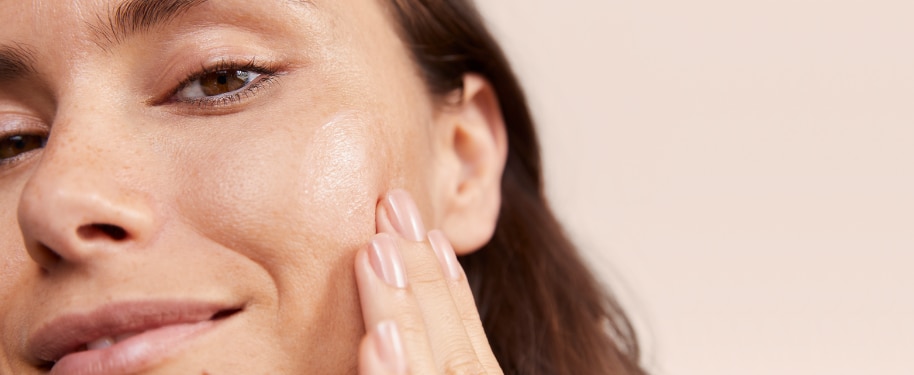A dermatologist’s guide to adult acne
Dr Tarryn Jacobs, Specialist Dermatologist
There are 3 distinct sub-types of acne found in adults. It can either be persistent, where it is present from the teenage years and fails to resolve or “late-onset” where it develops for the first time over the age of 25. Finally, relapsing acne has regression after adolescence and then unfortunately resurfaces in adulthood.
What is the cause of adult acne?
Acne is caused by a complex interaction of factors whereby male sex hormones known as androgens stimulate the oil glands to secrete sebum which results in the blockage of pores. Bacteria that normally live on the skin surface can then multiply within the pores and drive inflammation.
Adult female acne is commonly referred to as “hormonal acne.” However, in reality, all acne is hormonally mediated. A more appropriate term for adult females would be “premenstrual” acne as monthly hormone fluctuations play a key role in acne flares. In addition to hormones, other factors such as stress, diet and environmental pollution may play a role in exacerbating acne for some people.
What does adult female acne look like?
Acne in adult females tends to show up on the cheeks, around the mouth and lower chin areas (known as the U-zone). However recent studies have questioned this and show that adult female acne can occur on other areas on the face similar to adolescent acne.
What is the psychological impact associated with adult acne?
Acne has a large impact on appearance and those suffering from acne understand all too well its effects on confidence and self-esteem, while provoking feelings of inadequacy. Acne in adult females has been found to cause even greater distress than in teenagers which means finding a solution that works for you is important.
What is a good skincare routine for acne-prone skin?
Choosing effective skincare products with the right ingredients is vital.
- Wash your face twice a day in the morning and evening. Cleansing is important to remove oil, dirt, and bacteria that have built up throughout the day. Choose a cleanser specially formulated for acne-prone skin.
- After cleansing, use a “non-comedogenic” moisturiser as even oily or acne-prone skin needs moisturising which will help to maintain a healthy skin barrier.
- Sunscreen should be part of everyone’s daily skincare routine. It is also useful to prevent the worsening of the dark spots that can be left behind from blemishes.
- Avoid the use of facial oils and hair products that contain oil near the forehead.
What are the best ingredients to look for in skincare products?
Preventing breakouts as opposed to just reacting to new blemishes is key. For this reason, if you have adult acne-prone skin, I like to recommend having a retinoid in your skincare “toolbox”. Retinoids such as retinol or retinaldehyde are vitamin A derivatives that address and prevent clogged pores. They normalise the exfoliation of skin cells inside the pores whilst targeting the symptoms associated with inflammation. In addition, retinoids can help fade dark marks that can be left behind. Part of the conundrum of managing adult female acne-prone skin, is that women may simultaneously be dealing with concerns of skin aging as well. A great reassurance is that retinoids also have anti-aging benefits because it can stimulate collagen production.
Eau Thermale Avène Cleanance Women
This newly launched Cleanance Women range consists of the Corrective Serum and Smoothing Night Cream. It contains alpha-hydroxy acids in the form of glycolic and lactic acids, which are agents that exfoliate the upper layer of dead skin cells and so refines skin texture. Thanks to retinaldehyde, skin cell turnover is increased and so blemishes are prevented. Other ingredients include P-Refinyl, Synovea™ HR and X-Pressin™ which work together to exfoliate, provide antioxidant action and mattify skin.

If acne is caused by a hormone imbalance, should I get my hormones checked?
For most women, the answer to this question would be “no”. The majority of women will have normal levels of androgen hormones in their blood. This is because the androgen levels are higher locally in the skin. A dermatologist can advise on when hormone testing is needed, as acne can occur as part of another medical problem known as polycystic ovarian syndrome, which is characterised by irregular periods and excess hair growth.
How do dermatologists treat acne?
Treatment is largely the same for acne, regardless of what age it develops. Dermatologists can offer a wide range of treatments including creams, oral antibiotics and isotretinoin. For adult female acne, doctors often turn to hormonal treatments like the combined oral contraceptive pill.
Information courtesy of Dr Tarryn Jacobs, Specialist Dermatologist
https://pretoriadermatology.co.za/
Supporting References:
Poli F, Dreno B, Verschoore M. An epidemiological study of acne in female adults: results of a survey conducted in France. J Eur Acad Dermatol Venereol 2001; 15: 541-5.
Sin Pharmacol Physiol, 2018, Liu W et al - A Time-Series Study of the Effect of Air Pollution on Outpatient Visits for Acne Vulgaris in Beijing.
Zeichner JA, Baldwin HE, Cook-Bolden FE, Eichenfield LF, Fallon-Friedlander S, Rodriguez DA. Emerging Issues in Adult Female Acne. J Clin Aesthet Dermatol. 2017 Jan;10(1):37-46
